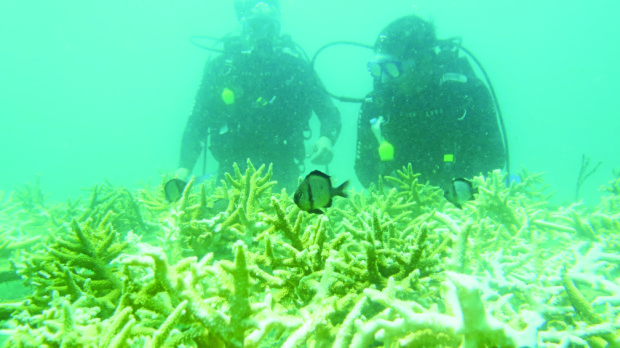Earth Day: Subic corals are nursed back to life

OCEAN-DEEP DEDICATION Divers andmembers of Sangkalikasan group check out damaged coral reefs in Subic Bay as part of a coral restoration project meant to preserve the area’smarine resources. CONTRIBUTED PHOTO
SUBIC BAY FREEPORT—To mark Earth Day here on Friday, a nongovernment organization (NGO) took to the seas.
Sangkalikasan Producers Cooperative has spearheaded efforts to nurse coral reefs back to health in Subic Bay, one of nine sites in the country where the NGO would carry out coral transplantation techniques under the reef restoration program of the government.
Restoring coral reefs damaged by destructive fishing activities and pollution would “contribute directly to the protection of coastal communities,” said Sangkalikasan project leader Jose Ramirez.
By “providing natural barriers, (the reefs improve) our marine ecosystem services, develop fishery resources, and enhance our underwater tourism industry,” he added.
According to Ramirez, “coral reefs sustain marine life and are the most diverse ecosystem on Earth.”
Article continues after this advertisementFunded by the Philippine Council for Agriculture, Aquatic and Natural Resources Research Development of the Department of Science and Technology, the coral restoration in Subic Bay would serve as a model project for beach resorts and coastal communities in the country, the project leader said.
Article continues after this advertisementRamirez said the group has partnered with All Hands Beach Resort to restore the damaged coral reefs after Grande Island Resort closed down in late 2015.
“The coral restoration in Subic Bay began in August last year. We set up coral nursery units (CNUs) and collected coral fragments found around Grande Island Resort,” Ramirez said, adding that the fragments are attached to the CNU for quick recovery and regeneration.
The process also increases the coral’s survival rates upon transplantation in degraded reef sites.
Sustainable fisheries
The program uses asexually reproduced corals to roll out coral transplantation technology meant to improve the productivity of coral resources for sustainable fisheries.
“After Grande Island’s closure, accessing the established CNUs was a great challenge. We had to look for a place where the corals we were nursing could adapt to the water’s right temperature and cleanliness,” Ramirez said.
The search led Ramirez’s team to All Hands Beach Resort, which is also known for its marine life conservation activities.
In Subic Bay, Sangkalikasan has transplanted a CNU in a 75-square-meter area of water about 490 meters away from the shoreline of the beach resort. There are 10,000 coral fragments being revived in the project site.
So far, the program has established 538 CNUs and transplanted 487,158 coral fragments.
A single CNU, which is made of metal frame, is designed to hold 500 coral fragments and can be used several times a year. The CNU design and the coral transplantation technique use marine epoxy, clay, nails and cable tie.
RELATED STORIES
Discovering Subic Bay’s hidden coves